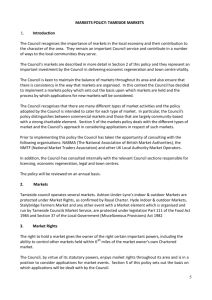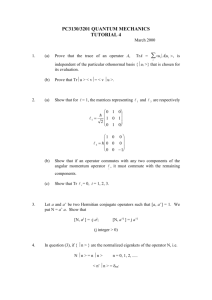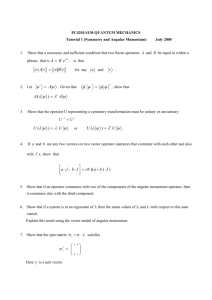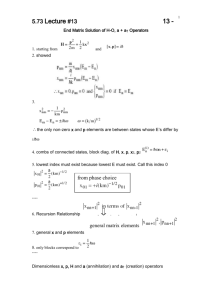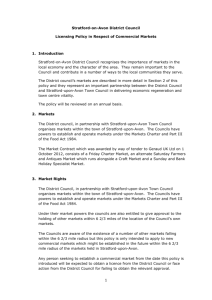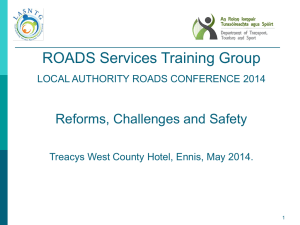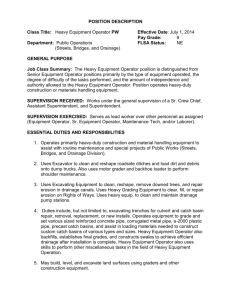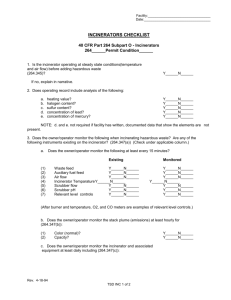Market Policy - Tameside Metropolitan Borough Council
advertisement
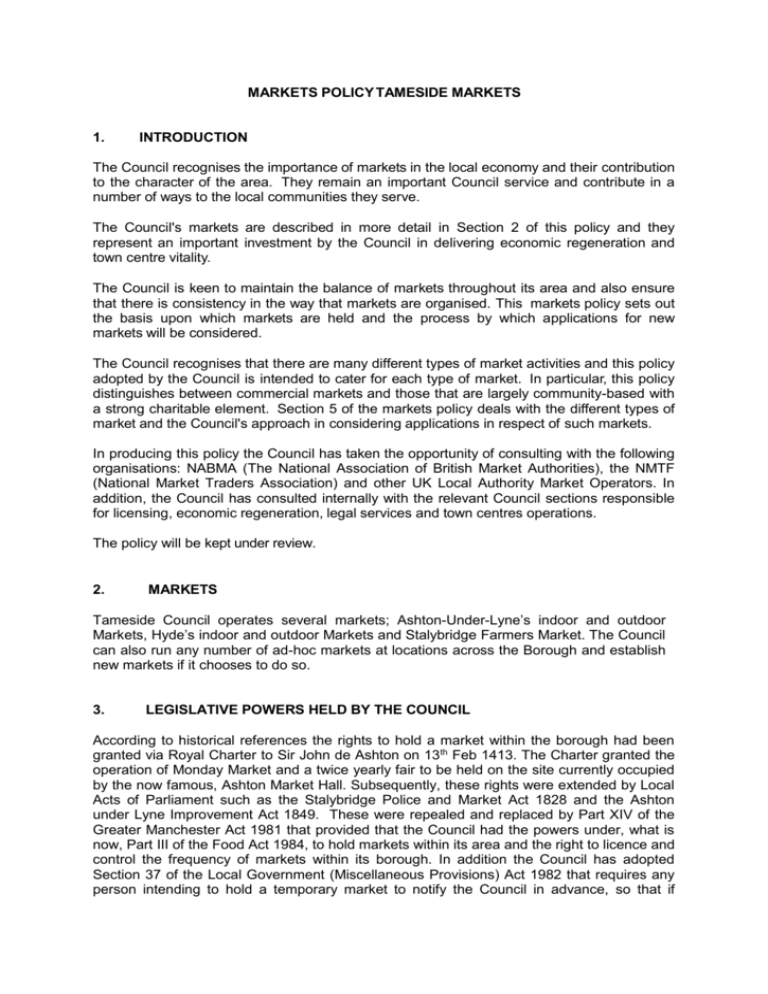
MARKETS POLICY TAMESIDE MARKETS 1. INTRODUCTION The Council recognises the importance of markets in the local economy and their contribution to the character of the area. They remain an important Council service and contribute in a number of ways to the local communities they serve. The Council's markets are described in more detail in Section 2 of this policy and they represent an important investment by the Council in delivering economic regeneration and town centre vitality. The Council is keen to maintain the balance of markets throughout its area and also ensure that there is consistency in the way that markets are organised. This markets policy sets out the basis upon which markets are held and the process by which applications for new markets will be considered. The Council recognises that there are many different types of market activities and this policy adopted by the Council is intended to cater for each type of market. In particular, this policy distinguishes between commercial markets and those that are largely community-based with a strong charitable element. Section 5 of the markets policy deals with the different types of market and the Council's approach in considering applications in respect of such markets. In producing this policy the Council has taken the opportunity of consulting with the following organisations: NABMA (The National Association of British Market Authorities), the NMTF (National Market Traders Association) and other UK Local Authority Market Operators. In addition, the Council has consulted internally with the relevant Council sections responsible for licensing, economic regeneration, legal services and town centres operations. The policy will be kept under review. 2. MARKETS Tameside Council operates several markets; Ashton-Under-Lyne’s indoor and outdoor Markets, Hyde’s indoor and outdoor Markets and Stalybridge Farmers Market. The Council can also run any number of ad-hoc markets at locations across the Borough and establish new markets if it chooses to do so. 3. LEGISLATIVE POWERS HELD BY THE COUNCIL According to historical references the rights to hold a market within the borough had been granted via Royal Charter to Sir John de Ashton on 13th Feb 1413. The Charter granted the operation of Monday Market and a twice yearly fair to be held on the site currently occupied by the now famous, Ashton Market Hall. Subsequently, these rights were extended by Local Acts of Parliament such as the Stalybridge Police and Market Act 1828 and the Ashton under Lyne Improvement Act 1849. These were repealed and replaced by Part XIV of the Greater Manchester Act 1981 that provided that the Council had the powers under, what is now, Part III of the Food Act 1984, to hold markets within its area and the right to licence and control the frequency of markets within its borough. In addition the Council has adopted Section 37 of the Local Government (Miscellaneous Provisions) Act 1982 that requires any person intending to hold a temporary market to notify the Council in advance, so that if appropriate the Council can take steps to remove the permitted development rights to hold such a market and require the operator to apply for planning permission to do so. This right has been exercisable for many years and this policy takes into account relevant UK and European legislation. 4. WHAT IS A MARKET EVENT? The Council's markets policy is intended to cover all market events held within the borough. In order that potential market operators are fully aware of the Council's definition of a market the following guidelines are provided: a) The legal definition of a market is a “concourse of buyers and sellers” (this means that the public are entitled to attend market events to buy and sell). b) A market will comprise not less than five stalls, stands, vehicles, whether moveable or not or pitches from which articles are sold. c) There will be an operator of the market who will be responsible for the organisation and delivery of the event. d) The term “market event” includes car boot sales, antique and craft markets, general markets, farmers' markets and charity markets. e) A market may sometimes be held as an integral part of a special event and where this arises the market element will fall within the Council's markets policy. The Council's markets policy differentiates between markets of a commercial nature and community-based markets which have a strong charitable element. This markets policy does not cover street trading activities. This activity is regulated by the Council’s licensing section. 5. LICENSING OF MARKETS UNDER THE COUNCIL'S MARKETS POLICY The Council's consent to a market event must be given before the market takes place. Markets will only be licensed once an application for a markets licence has been approved. Any market that takes place without such a licence is in breach of the Council's markets policy and will be subject to enforcement action as described in Section 10. The Council will consider applications in respect of the following categories of market events: i) ii) Commercial markets Markets with a strong charitable/community element The criteria set out in Section 4 will be relevant in respect of both categories of market event. i) Commercial markets A commercial market is one which is operated for profit and where the traders are engaged in a business activity of selling goods for their own purposes. The Council will consider applications in respect of commercial markets having regard to the following requirements: a) No market will be authorised to take place within the borough of Tameside unless it can be demonstrated that the new market will not undermine the existing markets and not prejudice the overall market offer. b) In respect of any consent the operator must have adequate insurances, comply with trading standards guidelines, health and safety requirements and any other statutory provisions laid down by the Council. c) A fee will be charged for any application to the Council, and a further fee charged to successful applicants. The fee will be based on the size and frequency of the market. P l e a s e refer to Section 8 in respect of fees. d) The goods to be sold on the market will be approved by the Council. e) A licensing agreement will be entered into between the operator and the Council and such licensing agreement must be concluded before the market takes place. f) The Council will insist on such other requirements as are deemed appropriate to ensure consumer and public safety standards. ii) Markets With A Strong Charitable/Community Element Some markets are organised by local communities or organisations with the intention of raising funds for a specific charity or celebrating a special event. The Council will consider applications in respect of such market events having regard to the following requirements: a) The markets must be operated on a non-profit making basis to assist a charity/community, and the operator shall supply relevant information to the Council if requested. While it is acknowledged that some traders will be selling goods for their own purposes, the Council will look for the event to have a strong charitable element in the way the event is organised. b) In respect of any consent the operator must have adequate insurances, comply with trading standards guidelines, health and safety requirements and any other statutory provisions laid down by the Council. c) A licensing agreement will be entered into between the operator and the Council and such licensing agreement must be concluded before the market takes place. d) The Council will insist on such other requirements as are deemed appropriate to ensure consumer and public safety standards. e) The operator must hold adequate proof that the charity they represent is registered with the Charity Commission, and also provide written permission from the charity organisation to raise funds on their behalf. 6. HOW TO APPLY The application form to hold a market in respect of both, commercial markets and charity/ community-based markets can be requested from the Markets Manager at: The Markets Manager Ashton Market Hall Bow Street Ashton under Lyne OL6 6BZ Or via the Councils website at: http://www.tameside.gov.uk/markets The application process will consider such matters as (but not limited to): Has an adequate Event Management Plan been completed with the inclusion of any relevant Risk Assessments? Has the operator held other events within the borough, if so how many and at what frequency? Has proof of any insurances/licences been provided? Including adequate Public and Employers Liability cover? Has permission been granted by the venue/land owner? The Council will aim to deal with applications for a markets licence within a period of twenty eight days from receipt of all the necessary information. Please note the separate requirement for notice under s37 Local Government (Miscellaneous Provisions) Act 1982; 10 below. An operator of a market event is therefore urged to return the application as early as possible to ensure that the Council has adequate time to consider the relevant matters in an appropriate way. In considering the application the Council will require sufficient information to deal with all the issues set out in the criteria listed above and also covered on the application form. Failure to provide such information is likely to lead to a delay in the Council coming to a decision. If the Council refuses an application it will set out the reasons for its decision. If the applicant wishes to appeal the decision then any appeal must be submitted within fourteen days of the Councils written decision, refer to section 7 in respect of the appeals procedure. 7. APPEALS PROCEDURE An applicant can appeal in writing against refusal, with supporting reasons, to the Assistant Director - Environmental Services. If the appeal is not resolved at this stage, the applicant will be referred to the Council’s Corporate Complaints Procedure. 8. FEES A reasonable administrative fee will be charged for applications. The Fee takes into consideration the time and cost to the Council of considering the application. If successful, there will be an additional administration fee for the processing of a license and regularly scheduled compliance visits. The Fee Scale can be obtained upon request at The Markets Manager Ashton Market Hall Bow Street Ashton under Lyne OL6 6BZ Or via the Councils website at: http://www.tameside.gov.uk/markets 9. OTHER APPROVALS It is important to emphasise that any approval given by the Council in respect of its market policy does not remove the requirement for other relevant approvals to be obtained. In particular the operator of a market should ensure that where the market is being held on private land, the approval of the landowner is obtained. Planning permission might also be required and any market operator should consult with the Council's Planning Department to ascertain whether any planning considerations are relevant. Attention is also drawn to the provisions of the Licensing Act 2003 in respect of any entertainment provided at the market or where a Temporary Events Notice might be required in respect of the sale of hot food or alcohol. A market licence does not constitute approval under any other statutory regime or remove the need for planning permission for the event. 10. SECTION 37 OF THE LOCAL GOVERNMENT (MISCELLANEOUS PROVISIONS) ACT 1982 Tameside Council has approved the adoption of Section 37 of the Local Government (Miscellaneous Provisions) Act 1982. This Section deals with temporary markets and any operator of a temporary market, together with the occupier of land on which the market is to be held, are required to give to the Council not less than one month's notice of the holding of the market. Any notice given by the operator and the occupier of the land shall state: i) The full name and address of the person intending to hold the market. ii) The day or days on which it is proposed that the market will be held and its proposed opening and closing times. iii) The site on which it is proposed that the market will be held. iv) The full name and address of the occupier of the land if he is not the person intending to hold the market. It is important to emphasise that the requirements of Section 37 are quite separate to the licensing of events under the Council's Markets Policy set out in Section 5. The operator and the occupier of the land should ensure that a notice is given to the Council under the requirements of Section 37 as soon as proposals for a temporary market are under consideration. This will enable the Council to give preliminary consideration to a proposal and indicate its likely view on a subsequent application for a markets licence. Failure to give a notice under Section 37 is a criminal offence and liable to a summary conviction in the Magistrates' Court 11. ENFORCEMENT The Council will monitor the application of its markets policy and any market event which is established will be subject to the Council's requirements. Any market which is not approved by the Council under Section 5 of its markets policy will be subject to legal action and the Council will seek an appropriate remedy in the courts to prevent the market being held and/or damages as appropriate. In addition, any market operator acting in contravention of any market license granted by the Council will run the risk of the license being terminated by the Council. On such terms as the Council determines and, in such circumstances, the Council reserves the right to refuse any future applications for market licenses submitted by the operator concerned, or any persons or organisation associated with the operator. 12. PARTNERSHIPS Tameside MBC Markets service will work with partners to extend our offer of specialist markets and events at venues all the across the Borough. Partnership operators will have to demonstrate a sound knowledge in their chosen field, and be able to source and organise an exciting and varied array of traders. Examples of specialist market/events could include: Records / Vinyl / Music Art and Design Antiques Craft Horticultural Vehicles / Bikes / Spares Fashion
